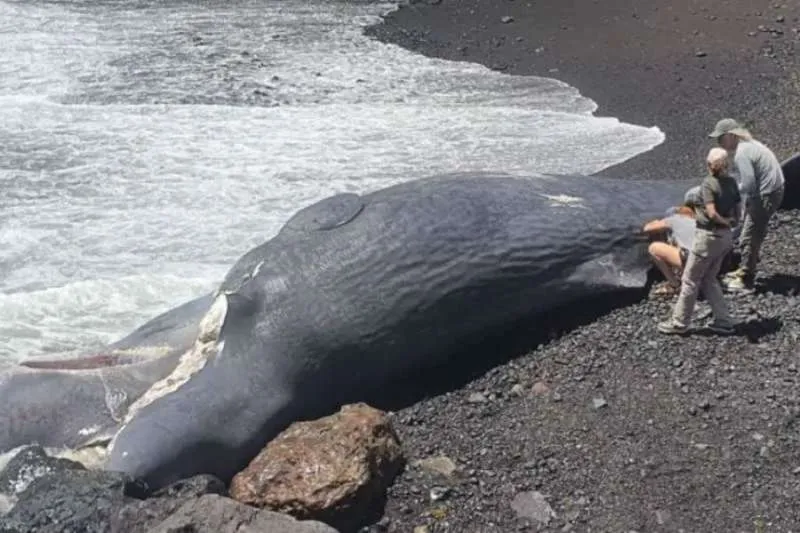Fatal head injury caused death of sperm whale stranded on Tenerife beach
- Oasis FM
- 03-06-2025
- Local News
- Photo Credit: DA
A young female sperm whale found stranded on a beach in Fasnia, Tenerife, died from a severe head trauma consistent with a high-impact collision, likely with a fast-moving vessel.
This is the conclusion of a preliminary necropsy report by the University Institute of Animal Health at the University of Las Palmas de Gran Canaria, accessed by Canarias Ahora.
The whale, measuring 9.8 metres in length and weighing 8.4 tonnes, was discovered on 21st May at Playa de los Roques. The report states that a clean cut more than two metres long on the whale’s head caused her death “within seconds or minutes.”
The necropsy, carried out by a team of 13 specialists at the Granadilla Industrial Estate, began at 8:50am and concluded at 3:00pm, after the burial of the remains in a designated area on site. Examiners estimated the whale had been dead between 24 and 36 hours prior to discovery.
On the same day and in the same area, a second sperm whale was spotted floating offshore. While it could not be recovered at the time, its remains were later found on 29th May in an advanced state of decomposition. Due to the level of decay, a full necropsy was not possible. However, DNA analysis is underway to confirm the animal’s identity and assess any familial link to the first whale.
Mounting Concerns Over Whale Mortality
According to the report, seven cetaceans, including sperm whales, a pygmy sperm whale, a beaked whale, a pilot whale, and a dolphin, have been found stranded or floating in Canary Islands waters over the past ten days. Most of these deaths are believed to have occurred due to natural causes.
However, the death of the sperm whale in Fasnia adds to growing concern about the vulnerability of these marine giants. Marine biologist Natacha Aguilar of the Canary Islands Oceanographic Centre and Marc Martín Solá of the University of La Laguna warned that sperm whales in the region are heading toward local extinction.
“In the Canary Islands, we have already lost too many,” they said. “Recent studies show a catastrophic decline, a 50% drop in sperm whale abundance in the region.”
Experts highlight that in less than a sperm whale’s typical lifespan (around 70 years), the speed of vessels has more than doubled, and the number of ships crossing their habitat has increased by over 100%, and in some areas, up to 300%.
“Throughout their lives, whales must adapt to increasingly frequent and faster maritime traffic, until one approach is too close, and it ends in tragedy,” they added.
This incident renews calls from conservationists and researchers for stricter regulations on high-speed ferries and maritime traffic in sensitive marine areas around the Canary Islands.


























